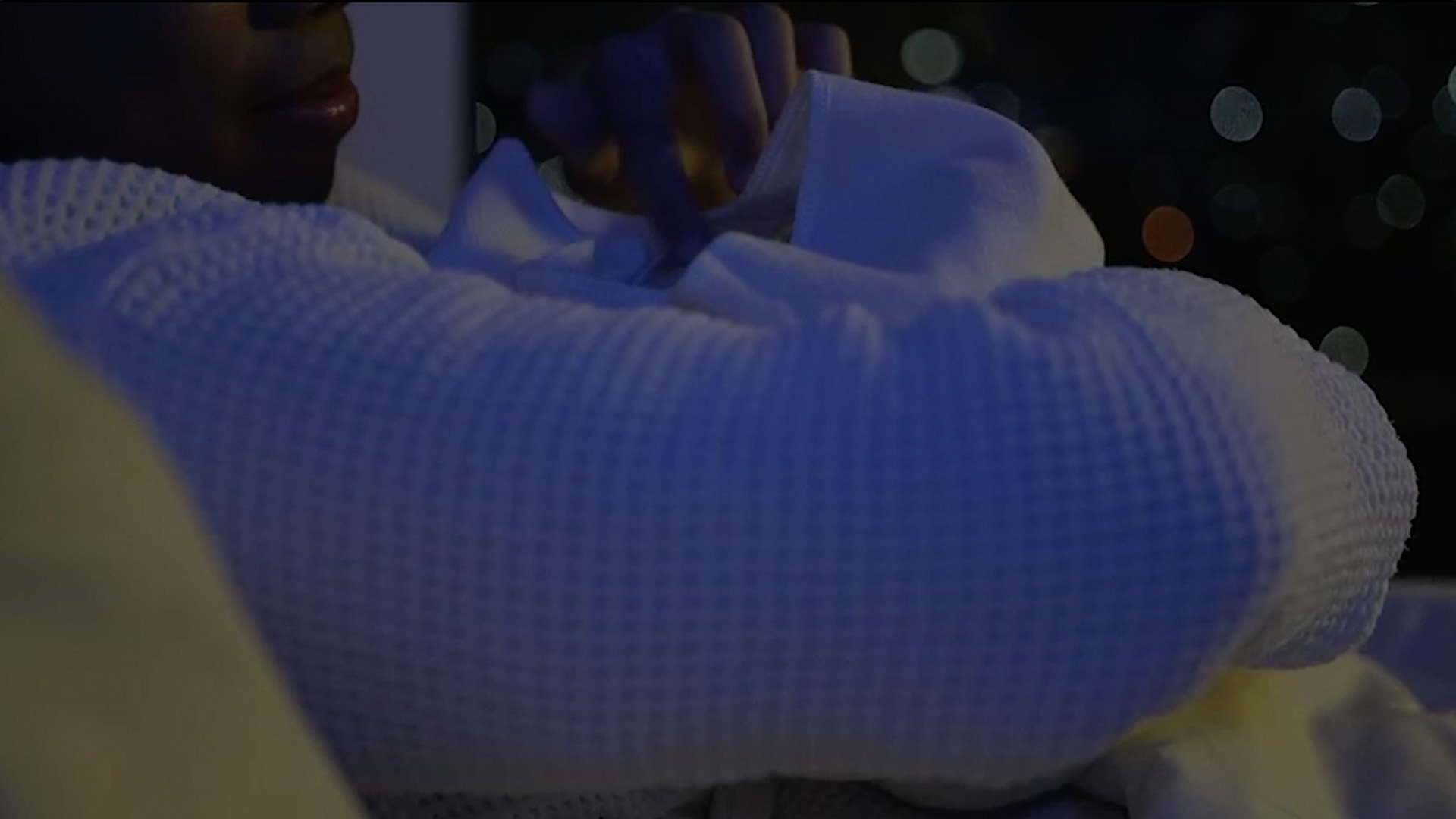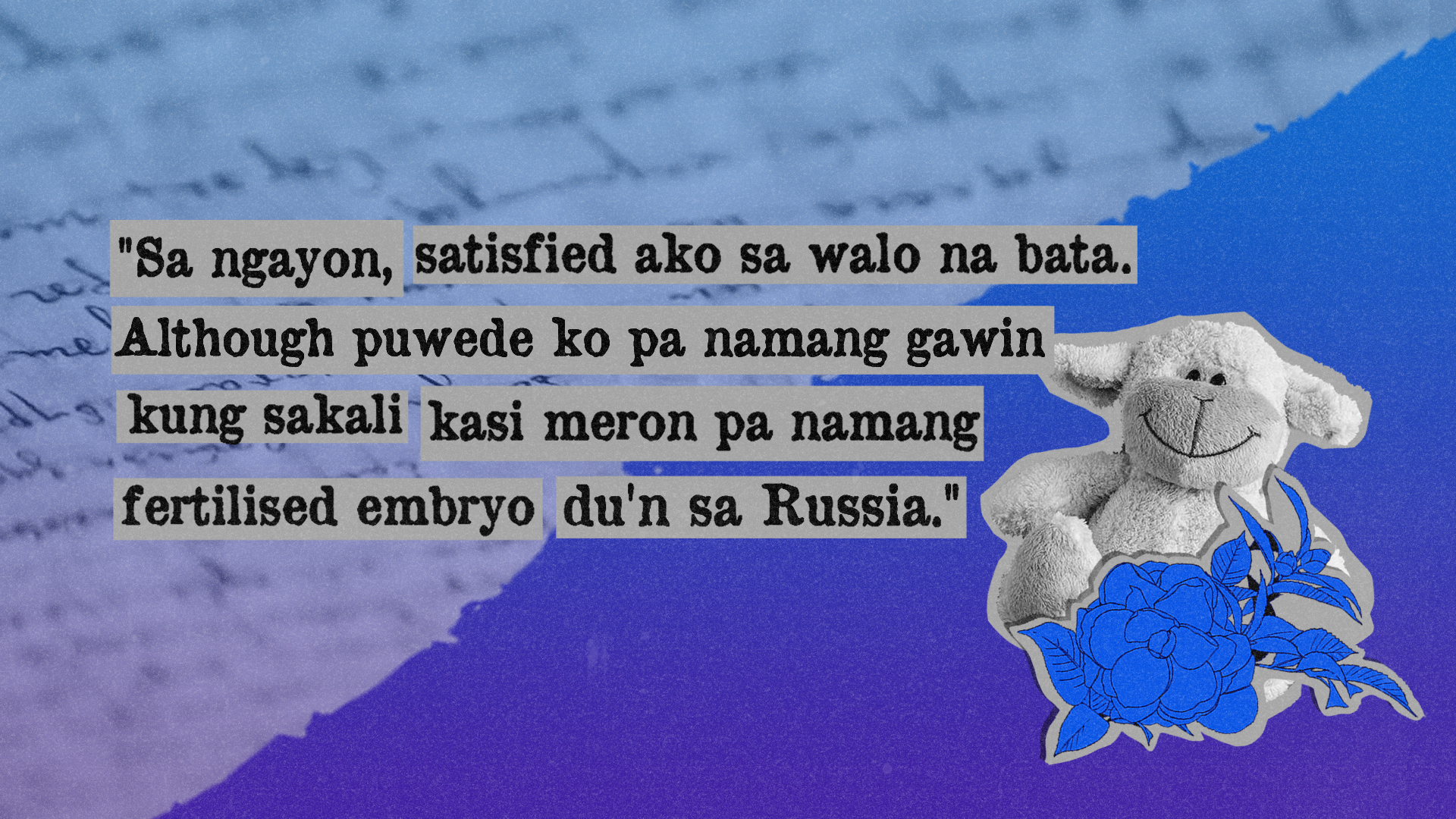We use cookies to ensure you get the best browsing experience. By continued use, you agree to our privacy policy and accept our use of such cookies. For further information, click FIND OUT MORE.
In the corners of the internet, a trade is trending. For money, women are turning their wombs into temporary sanctuaries for babies who would be other people’s children. With fees ranging from P300,000 to P1 million, mothers like Ruby and Diana are eager to go into the surrogacy business in the Philippines.
Ruby (not her real name) said her main reason for entering surrogate motherhood was to provide for her children.
“Masakit kasi hindi mo nabibigay yung gusto nila. ‘Pag mayroon silang kailangan, hindi mo bibigay. Kaya siguro pumasok din sa sistema ko na, oh sige, papasok ako sa ganitong trabaho kahit alam ko na, hindi ko alam kung, syempre ‘pag nanganganak ang isang babae, hindi mo alam kung gigising ka pa bukas o hindi na.”

Desperate to pull her children out of poverty, Ruby decided to live apart from them for almost a year, bearing a child for another couple.
“Nu’ng una, ang sabi ko sa mga anak ko, mag-a-abroad ako. Nung sinabi ko sa kanila yun na mag-aabroad ako, expected nila, abroad talaga, alis. Dala ko lahat ng gamit ko, wala akong tinira. Pero hindi ko sinasabi sa kanila na nandito lang ako sa Pilipinas. Dahil yun nga yung consequence. Dito ka sa Pilipinas, pero malayo ka sa mga anak mo.”
“Hindi ka pwedeng pumunta kasi makikita nila na buntis ka. Napakahirap talaga. Hindi mo sila makatabi pag may sakit sila, hindi mo sila maalagaan parang anytime pwede silang mawala. Tapos wala ka sa tabi nila, pero pinili mo magtago kasi hindi alam ng mga tao yung pinasok mo,” she added.
To keep her secret from her children, Ruby told them that she was working abroad to explain her absence. On video calls, she made sure they didn’t see her baby bump.
“Ayun, kalahati lang lagi pinapakita ko kasi hindi nila ko pwede makita na gano'n. Magugulat sila, Ma, bakit, ano, buntis ka? Akala ko ba nag-abroad ka?”
Ruby had already experienced the pain of being away from her child when she had a baby adopted by relatives.
“‘Yung bunso ko, inampon siya kasi nu’ng mga panahon na ‘yun talagang walang-wala. Wala na akong choice. Ngayon, nakakakain siya ng gusto niya, nakakainom siya ng gatas na afford ng kumuha sa kanya.”
Affected by the judgment of other people, including some relatives, Ruby could not deny its impact.
“Sobrang disappointed ako sa sarili ko, kasi parang bakit pinapasok ‘tong buhay na ito, tapos hindi ko naman pala kaya. Hindi ko kayang panindigan. Yung mga kamag-anak namin, sinasabi na pabaya akong magulang kasi nga, “Bakit?” ‘Pag sinasabi ko, “Bakit? Alam niyo ba ‘yung totoong kuwento?” Sinasabi lang nila sa akin, “Kung hindi ka pabayang magulang, bakit napupunta sa kanila yung anak mo?” Sinasabi ko, “Wala kasi kayong alam!”
During her surrogate pregnancy, Ruby lived in a "staff house." Here, she experienced a life akin to that of a princess, surrounded by caregivers and fellow surrogate mothers whose primary task was to ensure the birth of healthy babies.
“Sa staff house, sa bahay namin, pagpasok mo doon, siguro wala ka pang laman. So, maggagamot ka pa. Parang papakainin ka pa ng mga kailangan mong kainin para maging okay ‘yung matres mo. So, ‘pag nilagyan ka na ng anak, nilagyan ka na ng embryo, papahinga ka. Ibe-bed rest ka nila. Asikasuhin ka nila. Kukunan ka nila ng sarili mong mag-aasikaso sa'yo. Maglalaba. Kasi bawal kang kumilos. Lahat doon, bed rest ka lang. Wala kang ibang gagawin kasi kapakanan ng bata ang iniisip nila. ‘Pag may nangyari sa nanay, may mangyayari din sa bata.”
When the surrogate infant was born, Ruby tried to keep an emotional distance from the child, thinking it would be easy. After spending just three days together, she realized her mistake.
“Kahit three days lang kami nagkasama. Nine months siya sa tiyan ko, three days kami nagkasama. Minahal ko siya, na-attach ako sa kanya.”

When it was time to give the child away, Ruby had no choice but to endure the pain. “Parang pusa, kinuha na lang sa akin.”
“Lunok pride talaga, kahit anong sabihin nila, kahit baby maker. Ikaw, iisipin mo yung kinabukasan lagi ng anak mo.”
When asked if she's not worried about where the baby might end up, she said, “Bina-background check nila ‘yun tapos sinisigurado muna nila kung ikaw talaga ay magulang na handang magpakamagulang sa bata.”
Ruby said that she is now busy preparing for a scheduled meeting with her intended parents or IPs. The term refers to individuals or couples unable to conceive their child. However, these IPs have a condition for her pregnancy that worries Ruby.
“Meron akong nakausap na, dalawa. Yung isa, nasa Dubai. Ang gusto niya kasi traditional. Delikado pero siguro kailangan. Talagang risky nga. Wala talaga akong idea. Through sex po talaga. Lalaki ta’s ako. Hindi ako ready sa ganun kasi kalimitan talaga sa mga SM is IVF. Talagang tinatanim lang sa mga matres talaga. Pero ito, parang first time ko itong gagawin,” Ruby said.
(Writer’s note: While crafting this report, the DigiDokyu team discovered that "Ruby" has flown to another country to meet with the identified intended parents. We attempted to reach out again, but she did not respond to our messages.)
In the realm of reproductive health in the country, authorized fertility clinics operate under the Assisted Reproductive Technology (ART) framework, offering services such as in-vitro fertilization (IVF).
Dr. Rudie Frederick B. Mendiola, former president of the Philippine Society of Reproductive Medicine, stressed the importance of robust regulation and the establishment of laws to safeguard against exploitation within the surrogacy sector.
Fertility centers, like that of Dr. Mendiola, help couples who are facing challenges in conceiving.
“We're a fertility center and we help couples who are having problems conceiving. (Usual reasons for infertility include) male factor infertility, ibig sabihin, minsan sobrang baba ng count, or ‘yung motility, o ‘yung paggalaw, o ‘yung mababa o ‘yung morphology, o ‘yung itsura ng similia, ay abnormal. Another factor like ‘yung mga endometriosis, at mahirapan mag-meet yung egg and yung sperm.”
A tour of the clinic's facilities with Dr. Mendiola indicated meticulous procedures and a commitment to their best practices.
“So, dito lahat nangyayari. ‘Yung pag-check kung nakuha ba namin ‘yung itlog, ‘yung pag-alaga doon sa mga itlog, ‘yung semilya. Dito rin nangyayari ‘yung pagsama ng itlog at semilya. And ‘yung development, or yung culturing. And then, dito rin ginagawa ‘yung pag-freeze, pag-thaw, pati ‘yung sperm preparation. ‘Yan, incubators na ‘yan. So, parang ginagaya niya yung environment sa loob. Kung saan nagde-develop yung pinagsama mong itlog at semilya. ‘Yung room na yan, may positive pressure. And may mga HEPA filters na tinatawag. To make sure na walang mga particulate matter sa air.”

When asked about the cost of procedures, Dr. Mendiola said, “Sa isang treatment cycle, average mga 400,000 pesos.” However, this doesn't guarantee a successful pregnancy just yet.
Asked if his clinic engaged in surrogacy, he said, “Any third-party procedures. Meaning, we do not donate eggs, we do not do donor sperm, and we do not do surrogacy.”
As a former head of their society of doctors, Dr. Mendiola expressed concern over underground surrogacy clinics operated by professional medical practitioners like him.
“Well, definitely our society is not in favor of this. Kasi nga ang society namin, sinisigurado namin na lahat ng practicing centers should be accredited by our society. Syempre, medyo kulang siya sa ngipin. Wala kaming police powers. We only regulate those who have themselves accredited.”
“And by law, of course, there's nothing that we can do to stop them. Kaya nga importante na magkaroon tayo ng laws para ma-regulate, para masigurado natin na wala tayong na-exploit.” he added.
In the Philippines, surrogacy is associated with luxury, a path often traversed by rich couples seeking to fulfill their surrogate parenthood dreams legally, albeit doing it overseas.
Joel Cruz, a prominent businessman, shared his unique tale of fatherhood, having welcomed eight children through the intricate process of surrogacy.
“There's a law firm in Russia. Mamimili ka among the egg donors. I choose her, their mom kasi she's matangkad, sabi ko para tumangkad ‘yung mga anak ko,” Cruz said.
“Well bibigyan ka niya ng candidates, ‘yung egg donor ko is her name is Lilia. Na-carry niya ‘yung unang set ng twins si Prince at Princess. ‘Yung mga second twin the third twin at saka yung 7 and 8 na anak ko hindi na siya nag-carry for 9 months, kumuha na kami ng (ibang) surrogate mothers,” he added.

Reflecting on the complexities of his journey, Cruz acknowledged the challenges, both emotional and financial.
“Itong journey ko na ito ay hindi ganoon kadali. Mababa ‘yung sperm count ko, I was stressed, maraming trabaho. Unfortunately, lahat ‘yun nalaglag di kumapit so we spent millions of pesos na rin nun. So itong journey na ito mahirap, matrabaho at mahal.”
Cruz told DigiDokyu that he still had six fertilized embryos in Russia, should he wish to add another child to his family.
“Well sa ngayon satisfied ako sa walo na bata although pwede ko pa namang gawin kung sakali kasi meron pa namang fertilized embryo dun sa Russia.”
Cruz, who’s known for his perfume brand, considers his children as a divine blessing.
“Talagang pasasalamat sa itaas na binigyan ako ng mapagmahal na bata, ang sarap ng pakiramdam parang hindi mo ito maipagpapalit sa iba pang bagay, pera hindi, sa success mo hindi rin.”
“‘Dun ako natutuwa in such a way na na-prove ko kahit wala akong presence ng isang ina nakayanan ko bilang ama na tumayo bilang magulang nila,” he added.
Diana (not her real name) another surrogate mother, shared a darker reality she personally experienced.
"Hindi po siya nabuo, kasi po ang inabot namin stress, gutom. Physical abuse. Ako, inalila talaga."
Diana recounted how she discovered the job.
“Meron akong isang kakilala na nag-udyok sa akin na, 'Oh pumasok ka sa ganitong trabaho kasi daw malaki ‘yung kita.' As a single mom gusto ko talagang makapagpatayo ng sarili kong bahay. Kahit alam ko namang risky, pero pinasok ko pa rin siya para sa mga anak. And then, first day namin, so hirap kami sa pagkain para po kaming patay gutom.”
“Pag narinig mo yung kaldero, dapat bumaba ka na agad kasi mauubusan ka ng pagkain. Nakakulong talaga kami. Ang ceiling fan namin ay isang piraso lang. Saka po ‘yung higaan namin ang sikip para po kaming sardinas’, she added.
“Inabot namin stress, gutom,” Diana said.
She said that they were tasked with cleaning a large house, something that she wasn't told when she accepted the job.
“Sa trabaho naman, routine kami. So kailangan, kapag schedule mo, kailangan mo maglinis up and down. Lililisan mo, and then pero kapag malaking garage din andun ‘yung mga mga aso na 32 piraso, tapos lilinisin mo yun. Pakakainin mo, paliliguan mo yung mga aso.”
Unlike Ruby, who had maids provided to serve the SMs, and was directly compensated by the IPs, Diana has to cover the cost of her maid, which is deducted from her supposed salary.
“May katulong nga kami, pero hindi rin fair. Kasi yung katulong namin, kami rin mismo ang magpapasuweldo. Galing sa pera, galing sa amin ang sahod.”

Diana said some claim that their caretakers go as far as laying their hands on the pregnant surrogates.
“Physical abuse. Sinapak siya (‘yung kasama ko) doon. Nagatungan, hanggang sa nagalit po. Kaya ayun sinapak."
Diana considers her experience a nightmare. She blamed her miscarriage on the abuse she experienced.
“Hindi po siya nabuo, hindi siya nabuo kasi po ang inabot namin stress, gutom. Iyan po kasi ‘pag na-transferan ka na, budget po talaga ‘yung pagkain. Konting-konti lang po. Isang sandok lang. At saka konting pagkain.”
Diana found for a way to escape the staff house, “Nagdahilan lang ako na masakit yung ulo ko, bibili po ako ng gamot. Ang ginawa ko, nagbook na po ako.”
“Nag doble-doble ako ng pants tapos damit. Tapos yung iba naman ah, may binitbit din ako, sabi ko lang basura. Sabi ko idederetso ko na rin kasi lalabas na din naman,” she added.
She said there was a cellphone inside the staff house, but they were not allowed to use it all the time. “Meron po pero nakaw-nakaw na. Hindi po pwede yung parating may cellphone.”
In 2019, two Filipino women were apprehended by the Bureau of Immigration for an alleged surrogacy transaction in China.
“Meron tayong mga na-intercept sa ating mga paliparan, mga ilang cases of mga Filipinas na na-recruit upang maging surrogates. And we have forwarded these cases to the IACAT para po further ma-investigahan at makasuhan yung pinaka-recruiter nila. ‘Yun po yung ayaw natin na parang factory po tayo ng mga kababaihan na gagamitin for surrogacy at nagiging negosyo po ito ng ilang mga recruiters na gumagawa nito,” BI spokesperson Dana Sandoval said.
Advocates for women's and children's rights shared their concerns about the issue.
“Kaya nagre-result sa surrogacy yung mga kababaihan dahil sa dalawa siyang problema. Usapin ng kakulangan ng repro health at the same time, yung labis talaga ng kahirapan dito sa ating bansa. May karapatan tayo, pero mayroon din tayong responsibilidad sa ating sarili at sa ating lipunan. Responsibilidad din ng ating gobyerno na tiyakin na yung mga kababaihan, mayroong ligtas na environment for them to reproduce,” KJ Catequista of Gabriela Women’s Party said.
Children and gender rights advocate, Atty. Archill Capistrano said that Filipinos have deeper reasons for entering this kind of work.
“Ang usapin ng surrogacy kasi, komplikado siya. Hindi mo dapat ini-impose kung ano ang moralidad, kung ano ang tama. So it's basically the conditions of these women, for instance, and we do not blame them. In fact, it is not good to judge them. Instead of banning, you regulate.”
Law expert Atty. Christian Sia suggests that social media pages should be held accountable.
“We have a law against human trafficking. Pwede kasi makonsider yan lalo kung may bayad, sexual exploitation for money. So may criminal liability. Pwedeng i-operate ng PNP natin kasi enforcement of our criminal laws ang issue diyan. And mas mataas yung penalty kasi any offense, existing offense you committed through the use of computers or internet technology mas mataas ang penalty.”

In May 2023, a lawmaker proposed House Bill 8301 to regulate assisted reproductive technology, including surrogacy, in the country.
“Currently, the bill is under the office of the chairman of the Committee on health. Kaso medyo na-hold siya konti kasi we're preparing for the 2024 budget. Sa ngayon, wala po tayong batas, kung sinong nagkasala, whether yung carrier o yung pares talaga, wala tayong mahabol. But if we will have this law, the soonest, then we can chase them,” bill author Zamboanga Rep. Khymer Adan Olaso said.
At present, Diana is an online seller and has no plans of ever returning to surrogacy. “Nakakatrauma siya kasi hindi ka naman nila ite-treat ng maayos.”
“At saka isa pa, nakakababa rin yung tingin. Dahil sobrang baba ng tingin nila sa amin. Ang nasa isip kasi nila, du'n sa narinig ko nga, ‘yung CEO mismo siya nagsalita. Kaya du'n ako talaga, sobrang ang baba ng tingin ko sarili ko," Diana said.
"Ang sabi niya, 'Naku, ano lang yan? Binabayaran lang naman yan. Dapat sumunod sila kasi ganito naman, pinapakain naman sila."
There appears to be hope for intended parents in the Philippines, as the possibility of legalizing assisted reproductive technology (ART) emerges.
The intricacies of ART and surrogacy in the country remain under study but these discussions in government bring hope to childless couples as well as surrogates like Ruby and Diana for more inclusive and safer reproductive and labor practices in the country. —NB, GMA Integrated News
